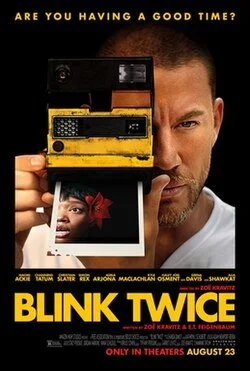Paradise Engineered: Memory, Manipulation, and the Artifice of Control in Blink Twice
Tyler R Letren, CEO & Founder
Paradise Engineered: Memory, Manipulation, and the Artifice of Control in Blink Twice
Zoë Kravitz’s 2024 directorial debut, Blink Twice, disguises a chilling psychological thriller beneath the tropical gleam of luxury and leisure. What begins as an aspirational escape for cocktail waitress Frida (Naomi Ackie) quickly turns into a disorienting descent into control, consent, and manipulated memory.
At its surface, the film tells the story of a woman invited to a billionaire’s private island. But underneath lies something far more sinister. With its saturated color palette, evolving dialogue, and a tightly constructed narrative that begins to come apart as memory itself is challenged, Blink Twice invites audiences not just to witness but to experience a curated breakdown of reality.
Visual Language of a Beautiful Lie
Cinematographer Adam Newport-Berra washes the film in sun-drenched tones and symmetrical visuals. The result is a paradise that looks too perfect. The camera doesn’t just observe the island; it enforces its symmetry, its artificial stillness. Recurring motifs — red gift bags, snakes in the frame’s periphery — provide subconscious warnings. These visual choices aren’t decoration. They are part of the manipulation.
This aesthetic misdirection mirrors the experience of Frida herself. She arrives filled with curiosity and subtle caution. The island opens its arms, but the grip tightens gradually. Her shifting gaze becomes the viewer’s own, guiding us from wonder to skepticism to dread.
Fractured Dialogue and Mind Games
At first, the dialogue is sharp and modern. Frida and her friend Jess (Alia Shawkat) trade remarks that feel fresh and real.
“So do you think the human sacrifice is before or after dinner?” Jess jokes, half-sarcastic. The comment, while funny, also sets the tone — something beneath this experience is wrong.
As time passes, the film’s dialogue begins to stutter. Characters forget conversations. Their sentences loop or fall apart mid-thought. Frida’s quiet observation marks the shift: “I feel like we’re forgetting a lot of stuff.”
Slater King (Channing Tatum), the charismatic host, delivers his control with charm and precision. “We do drugs, but we just do them with intention,” he says, disguising coercion in the language of wellness. It is a quiet indoctrination. Consent becomes performance. Individual agency dissolves.
Memory, Hypnosis, and the Ethics of Forgetting
The island’s key feature — a perfume derived from native flora that can erase memory — is fictional, but the psychology behind it is not.
Research from Frontiers in Psychology shows that under hypnosis, memory recall can be altered. In some cases, false memories are implanted. A 2020 study confirmed that participants exposed to post-hypnotic suggestions could forget specific details or fabricate others, all while believing their memory was accurate.
The film dramatizes this with harrowing clarity. Guests aren’t just forgetting trauma. They are being stripped of the knowledge that anything happened at all. One of the most telling exchanges comes between Slater and Lucas:
“What did I do?” Lucas asks.
“Nothing,” Slater replies.
“Thank God.”
“No,” Slater corrects him. “I meant, you did nothing. You did nothing for yourself.”
This moment cuts to the core of the film’s ethics. It is not just what people remember that defines them. It is what they do with that memory. And when memory is gone, so is accountability.
A Repetition Without Meaning
Toward the climax, Slater’s mask slips. His apologies come rapid and hollow: “Sorry. Sorry. Sorry. Sorry. Sorry. Sorry. Sorry. Sorry. Sorry. Sorry.” Ten times. The repetition mirrors a hypnosis script. It is not confession. It is conditioning.
He does not want forgiveness. He wants submission.
A Cautionary Dreamscape
Blink Twice is not a perfect film. Some critics have noted its loose plotting or uneven pacing. But these flaws also feel intentional. Like a manipulated memory, the film skips. It repeats. It forgets. What lingers is not a tight story but a disturbing atmosphere that cannot be shaken off.
Kravitz has not made a cautionary tale about futuristic mind control. She has made something more relevant — a reflection on how power hides in luxury, how silence becomes safety, and how the most effective control does not look like violence but feels like forgetting.
Final Thought
Blink Twice asks what happens when our sense of truth becomes a souvenir — something we take home in a bag we didn’t pack, from a place we can’t quite remember visiting.
Kravitz is not simply interested in whether we remember. She wants to know who wrote the memory in the first place.


